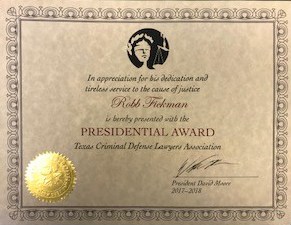
Houston Sex Crimes Lawyer
State Sex Crimes Lawyer Robert Fickman Successfully Representing Clients under Investigation and Charged with State Sex Offenses
Robert Fickman is an experienced criminal defense lawyer with over 39 years of experience vigorously defending individuals who have been investigated or charged with state sex offenses. Robert Fickman has an AV rating with Martindale-Hubbell. That is Martindale-Hubbell’s highest rating. Mr. Fickman has been recognized for many years by Thomson Reuters as a Houston area Criminal Defense Super Lawyer.
Mr. Fickman has investigated cases and stopped sex crime charges from ever being filed. He has convinced police officers and prosecutors not to pursue sex crimes. Mr. Fickman has fought sex crimes before the grand jury and presented packages to the grand jury on behalf of his clients. He has convinced grand juries not to charge his clients with sex crimes. When his clients have already been charged with sex crimes, Mr. Fickman has obtained the dismissal of serious state sex charges. He has convinced prosecutors to throw out state sex charges. Mr. Fickman has tried and won very serious sex crime cases. He has saved his clients from prison by winning sex cases and obtaining Not Guilty Verdicts. Most recently, in 2022, after a three-year fight in a case involving thousands of pages of police, medical, therapy, and psychological reports, Mr. Fickman convinced the State to dismiss serious Indecency with Child charges.
Robert Fickman Teaches Other Lawyers How to Defend State Sex Crime Cases
Mr. Fickman has been invited to teach other lawyers how to investigate and defend criminal cases for many years. In 2010, 2104, and 2022 Mr. Fickman taught cross-examination to other defense lawyers at a National Association of Criminal Defense Lawyers’ Annual Seminar in Las Vegas, Nevada. In 2010, 2014, and 2022 he was featured on the NACDL “Best Speakers of the Year” DVD.
Mr. Fickman has taught other criminal defense lawyers from across the country how to defend criminal cases. He has appeared as a guest speaker at criminal defense legal seminars in San Francisco, Las Vegas, Memphis, Pensacola, and Maine. Mr. Fickman has appeared as a guest speaker in Texas at criminal law seminars in Houston, Austin, San Antonio, El Paso, Lubbock, Galveston, and Round Rock. Mr. Fickman has taught other criminal defense lawyers Pretrial Investigation, Trial Preparation, Cross Examination, Final Argument, and Creative Use of the Courtroom.
Robert Fickman has successfully defended people from all walks of life who have found themselves facing serious sex crime charges.
Sex Crimes Investigations Involving Child Complainants
State Sex Crimes investigations involving child complainants can be complicated and take time. If you believe you are being accused or are under investigation for an alleged sex offense involving a child, you should immediately contact State Sex Crimes Lawyer Robert Fickman.
Do Not Talk to Anyone. Most importantly, you should not speak to anyone about the allegation. You should not talk to any police officer, police investigator, or any law enforcement officer. You should not talk to any Child Protective Service Investigator. If you believe you are under investigation, you should immediately retain counsel to protect your legal rights. Robert Fickman has successfully defended people who were under investigation and kept them from being charged with State Sex offenses. Police officers gather evidence in support of sex allegations.
Listed below are common forms of evidence that police officers attempt to gather. Also listed are investigative techniques used by police officers when investigating sex allegations made by children:
- Obtaining the Outcry Statement of the Complainant. Police officers and investigators will obtain a copy of the Outcry statement of any complainant younger than 14 years of age. The Outcry statement is the first statement of the allegation made by the complainant to someone 18 years or older other than the accused.
- Children’s Assessment Center Interviews of the Child Complaint. A child complainant will be interviewed about their allegation at the Children’s Assessment Center. The interview will be recorded, and police officers will watch the interview. Police officers obtain a copy of the CAC videotaped interview to provide to the District Attorney’s Office.
- Child Protective Services Investigations. Police officers work with Children’s Protective Services (CPS) on child sex investigations. CPS will oftentimes interview the child as well as family members. CPS will also try to interview the accused. No person accused of a child sex offense should speak to CPS without first speaking to a lawyer. Speaking to CPS should be treated the same as speaking to police officers. In some ways, speaking to CPS is more dangerous because they will make themselves sound neutral when they are almost always pro-prosecution.
- Child Protective Services Recommended Therapists. CPS will sometimes refer an accused person to a CPS-recommended “therapist.” The accused will be misled by CPS. The accused will be led to believe that if they confess to the CPS-recommended “therapist,” the matter will be resolved. This is a lie used by CPS to trick people into confessing to sex crimes they may or may not have committed. There is no privilege with this therapist. Talking to the CPS Recommended- Therapist is no different from talking to the police. The CPS recommended “therapist” works in cahoots with CPS to obtain evidence against the accused. The notes and records of this therapist will be handed over to the prosecutor. An admission made to the therapist may be admissible against the accused. Anyone under investigation for a sex offense should consult with their own lawyer before deciding whether or not to talk to CPS or their recommended “therapist.”
- Obtaining Medical Records of the Complainant. There will often be a medical examination conducted on a child complainant. These examinations and the findings are essential. The statements made by the child to the examining doctor are necessary. Sometimes these examinations are short, but the findings can be significant.
- Interviewing Other Witnesses that may Support the Complainant. Police officers will typically interview any witnesses that they think will support the complainant’s allegation. Who those potential witnesses are depends on the surrounding circumstances of the allegation. If a mother and stepfather are going through a divorce, it is not uncommon for a child complainant to accuse the stepfather of a sex offense. In this scenario, the mother and those related to the mother are often supportive of the complainant’s story. If a student accuses a school teacher of a sex offense, then friends and family members of the complainant student will often be supportive of the complainant’s story.
- Background Investigation. Police Officers will always run the criminal record of anyone accused of a child sex offense. If they find that the suspect has any prior criminal record, that will strengthen their belief that the suspect may, in fact, be guilty.
Police officers will also inquire whether any other child has ever accused the person of doing anything sexually inappropriate. Police officers will investigate any prior complaints made against the accused.
- Obtaining Confessions. Police officers will use a variety of techniques to try and secure a confession from a person who is accused of a child sex offense. It is essential to know that police officers will, at times, make misleading and even false statements to suspects to secure a confession. Police officers often promise that if the suspect confesses, the officers will tell the prosecutor, which will help the suspect get a lighter charge or sentence. This kind of statement is misleading. Police officers have no authority to enter into any binding agreement on the District Attorney’s Office.
- Deceptive Use of Polygraph Exams. Police officers will often ask the accused to take a police polygraph. If the accused agrees to take the police polygraph test, police officers will often tell the accused that they failed the polygraph examination. They will tell the person they failed the polygraph examination to get the accused person to confess. If a person is detained or arrested, they should talk to a lawyer before making any statement to any police officer. The police officer’s job is to investigate criminal allegations. It is not the police officer’s job to give the accused legal advice. Contacting a lawyer to seek legal advice is not evidence of guilt; it shows that an innocent person will not allow himself to be railroaded by anyone, including aggressive police officers.
State Sex Crimes Involving Child Complainants
State Sex Crimes Lawyer Robert Fickman defends clients accused of all kinds of state sex crimes. The most common state sex crimes involving children are:
- Indecency with a Child
- Sexual Assault of a Child
- Aggravated Sexual Assault of a Child
- Continuous Sexual Abuse of a Child
- Improper Relationship Between Educator and Student
- Online Solicitation of a Child
Indecency With a Child Charges
Texas Penal Code Section 21.11 provides in part that,
A person commits Indecency with a Child, if with a child younger than 17 years of age, whether the child is of the same or opposite sex, and regardless of whether the person knows the age of the child at the time of the offense, the person:
- Engages in sexual contact with the child or causes the child to engage in sexual contact; or
- With the intent to arouse or gratify the sexual desire of any person:
- Exposes the person’s anus or any part of the person’s genitals, knowing the child is present; or
(B) Causes the child to expose the child’s anus or any part of the child’s genitals.
In this section, “sexual contact” means the following acts, if committed with the intent to arouse or gratify the sexual desire of the person:
- Any touching by a person, including touching through clothing, of the anus, breast, or any part of the genitals of a child; or
- Any touching of any part of a child’s body, including through clothing with the anus, breast, or any part of the genitals of a person.
Where there is “sexual contact” alleged, Indecency with a Child is a second-degree felony with a punishment range of 2 to 20 years in prison. Where there is exposure alleged, Indecency with a Child is a third-degree felony with a punishment range of 2 to 10 years in prison. Indecency with a Child is one of the most common sex crime charges made. A person can be sent to prison if convicted of Indecency with Child. That is one reason that if one is charged with Indecency with a Child in State court, one must obtain the best possible lawyer they can afford. Robert Fickman has successfully handled Indecency with Child cases for almost four decades. He knows what is at stake, and he will fight for you.
Sexual Assault of a Child Charges
Texas Penal Code Section 22.011 provides in part that,
A person commits Sexual Assault of a Child if with a child younger than 17 years of age, whether the child is of the same or opposite sex, and regardless of whether the person knows the age of the child at the time of the offense, the person:
(A) Causes the penetration of the anus or sexual organ of a child by any means;
(B) Causes the penetration of the mouth of the child by the sexual organ of the actor;
(C ) Causes the sexual organ of a child to contract or penetrate the mouth, anus, or sexual organ of another person, including the actor;
(D) Causes the anus of the child to come into contact with the mouth, anus, or sexual organ of another person, including the actor: or
(E) Causes the mouth of a child to contact the anus or sexual organ of another person, including the actor.
Under this statute, “A Child” means a person younger than 17 years of age. The specific circumstances of the allegation determine the offense level. In some circumstances, Sexual Assault of a Child may be charged as a first-degree felony with a punishment range of 5 to 99 years or life in prison. In other circumstances, Sexual Assault of a Child may be charged as a second-degree felony with a punishment range of 2 to 20 years in prison. Either way, Sexual Assault of a Child is a very serious offense and must be treated accordingly.
Some statutory defenses may be used against these charges depending on the circumstances of the case. For instance, in some situations, it is a defense to this Prosecution if the conduct consisted of medical care for the child and did not include any contact between the anus or sexual organ of the child and the mouth, anus, or sexual organ of the actor or a third party. It might be an Affirmative Defense to prosecution under this statute in some situations if the actor was the child’s spouse at the time of the alleged offense. It may also be an Affirmative Defense to prosecution under this statute, under some situations, if the actor was not more than three years older than the alleged victim at the time of the alleged offense.
Sexual Assault allegations are severe and the law can be complicated. That is one reason that if one is charged with Sexual Assault in State court, one must obtain the best possible lawyer they can afford. Robert Fickman has successfully handled Sexual Assault of Child cases for almost four decades. He knows what is at stake, and he will fight for you
Aggravated Sexual Assault of a Child Charges
Texas Penal Code Section 22.021 provides in part that,
A person commits Aggravated Sexual Assault if the person intentionally or knowingly:
(1) Causes the penetration of the anus or sexual organ of another person by any means without the person’s consent;
(2) Causes the penetration of the mouth of another person by the sexual organ of the actor without that person’s consent; or
(3) Causes the sexual organ of another person, without that person’s consent, to contact or penetrate the mouth, anus, or sexual organ of another person, including the actor.
Under this statute, the offense is a first-degree felony, punishable by 5 to 99 years or life if the victim is younger than 14 years of age, regardless of whether the person knows the age of the victim at the time of the offense. The minimum term of imprisonment for an offense under this section is increased to 25 years if:
- The victim of the offense is younger than six years of age at the time the offense is committed: or
- The victim of the offense is younger than 14 years of age at the time the offense is committed, and the actor:
(A) causes serious bodily injury or attempts to cause the death of the victim or another person during the same criminal episode; or
(B) if the person places the victim in fear of certain listed offenses, like kidnapping; or
(C) the person uses or exhibits a deadly weapon in the course of the same criminal episode;
(D) acts in concert with another who engages in the conduct; or
(E) with intent to commit the offense, the person administers or provides to the victim any substance capable of impairing the victim’s ability to appraise the nature of the act
A person can be sent to prison for life if convicted of Aggravated Sexual Assault of a Child. If one is charged with Aggravated Sexual Assault of a Child in State court, one must obtain the best possible lawyer they can afford. Robert Fickman has successfully handled Sex charges involving children for almost four decades. He knows what is at stake, and he will fight for you.
Continuous Sexual Abuse of a Child Charges
Texas Penal Code Section 21.02 provides in part that,
A person commits Continuous Sexual Abuse of a Child if:
- During a period that is 30 or more days in duration, the person commits two or more acts of sexual abuse, regardless of whether the acts of sexual abuse are committed against one or more victims; and
- At the time of the commission of each of the acts of sexual abuse, the actor is 17 years of age or older, and the victim is a child younger than 14 years of age, regardless of whether the actor knows the age of the victim at the time of the offense.
Under this statute, the offense is a first-degree felony. However, given the severity of the alleged offense, the minimum punishment for this offense is 25 years in prison. The maximum punishment is 99 years or life.
In a narrow set of circumstances, there is an affirmative defense to prosecution under this section where the accused is not more than five years older than the victim, and the alleged offense did not involve the use of duress, force, or threats. It should be understood that this affirmative defense is only available in a very narrow set of circumstances.
A person can be imprisoned for a minimum of 25 years if convicted of Continuous Sexual Abuse of a Child. If one is charged with Continuous Sexual Abuse of a Child in State court, one must obtain the best possible lawyer they can afford. Robert Fickman has successfully handled Continuous Sexual Abuse of Child charges involving children. He knows what is at stake, and he will fight for you.
Improper Relationship between Educator and Student Charges
Texas Penal Code Section 21.12 provides in part that,
An employee of a public or private primary or secondary school commits an offense if the employee engages in sexual conduct, sexual intercourse, or deviate sexual intercourse with a person who is enrolled in a public or private primary or secondary school at which the employee works. Notably, other individuals affiliated with a school may also be charged with this offense. Also, the offense may be charged when the student is not enrolled in the school but is participating in extracurricular activities sponsored by the school or school district.
Under this statute, the offense is a second-degree felony with a punishment range of 2 to 20 years in prison.
It is an affirmative defense to prosecution under this section that:
- The actor was the spouse of the enrolled person at the time of the offense; or
- The actor was not more than three years older than the enrolled person, and at the time of the offense, the alleged offense, the actor and the enrolled person were in a relationship that began before the actor’s employment at a public or private primary or secondary school.
A person can be sent to prison for 2 to 20 years if convicted of Improper Relationship between Educator and Student. If one is charged with an Improper Relationship between Educator and Student in State court, one must obtain the best possible lawyer they can afford. Robert Fickman has successfully handled Improper Relationships between Educator and Student Sex charges.
For many years Robert Fickman has successfully defended educators who have been falsely accused of sexual offenses by students. Robert Fickman has successfully defended teachers, counselors, band directors, assistant principals, school bus drivers, and other school personnel. Robert Fickman has extensive experience defending educators. For years, Robert Fickman has defended members of the Texas State Teachers Association as well as other teaching associations.
Educators are Particularly Vulnerable to False Allegations of Sexual Misconduct
Educators are often left in positions where they are alone with students. Principals, Assistant Principals, Coaches, Counselors, Band Directors, Drama teachers, and Choir directors are all often left alone with students. For years Robert Fickman voluntarily taught a course called “Defensive Teaching,” where he taught educators how to protect themselves from false allegations.
His primary advice involved being aware of students who were forming crushes or unhealthy attachments to the educator.
His other primary advice was to NEVER BE ALONE with a student. Robert Fickman advised educators always to have another adult present when meeting with the student. If a student wanted to meet with an educator after school, Robert Fickman advised that the educator arrange for another teacher to be present in the room. He warned against ever meeting alone with a student in a classroom with the door shut. This scenario was a prescription for disaster and left the teacher extremely vulnerable to a false allegation.
Mr. Fickman also strongly advised teachers never to give students rides or meet with them at any non-school-related function. Young male teachers are particularly naïve to their vulnerability to false allegations.
Online Solicitation of a Child Charges
Texas Penal Code Section 33.021 states in part,
A person who is 17 years of age or older commits an offense if, with the intent to commit Continuous Sexual Abuse of a child, Indecency with a Child, Sexual Assault, Aggravated Sexual Assault, Aggravated Promotion of Prostitution, Compelling Prostitution, Sexual Performance by a Child or Possession of Promotion of Child Pornography, or trafficking in persons, the person over the Internet, by electronic mail or text message or other electronic message service or system, or through a commercial online service, intentionally:
- Communicates in a sexually explicit manner with a minor; or
- Distributes sexually explicit material to a minor;
- Knowingly solicits a minor to meet another person, including the actor, with the intent that the minor will engage in sexual contact, sexual intercourse, or deviate sexual intercourse with the actor or another person.
An offense under this section may be a felony of a second or third degree, depending on the surrounding circumstance. If the minor is under 14 years of age or is believed to be under 14 years of age, the offense may be a second-degree felony. A second-degree felony is punishable by a sentence of 2 to 20 years in prison.
A person can be imprisoned for many years for Online Solicitation of a Minor. If one is charged with Online Solicitation of a Minor in State court, one must obtain the best possible lawyer they can afford. Robert Fickman has successfully handled Sex charges involving children for almost four decades. He knows what is at stake, and he will fight for you.
State Sex Crimes Lawyer Robert Fickman has Successfully Defended people Charged with Sex Crimes involving Children Using the following approaches:
A thorough Investigation is the key to successfully defending a Child’s False Allegation
Investigating the Allegation
One of the first steps is finding out exactly what the accusation is. This is not always as easy as it might seem. The child complainant will typically make a number of statements. The first statement made to an adult is called the Outcry statement. After that, the child may have been interviewed by Child Protective Services and/or the police. The child will also be interviewed at the Children’s Assessment Center.
Investigating How the Allegation was Obtained
It is important to review all of the child’s statements. Quite often, the child is asked leading or suggestive questions during the CAC interview. Quite often, the child’s story has grown or substantially changed over time. Substantial changes in the accusation draw into question the credibility of the accusation.
Learning Whether the Child had a Motive to Lie?
The first question people ask is, “If the child is lying, why are they lying?”
The answer to this question is rarely readily apparent. To answer this question, one has to dig deep into the parties’ relationship. Young children can have ideas planted in their heads. An adult may influence a young child to make a false allegation. With enough reinforcement, a young child can come to believe that a made-up story is actually true. In an ugly divorce, it is not uncommon for stepchildren to make up allegations against a stepfather.
Investigating the Pre-existing Relationship between the Child and the Accused and the Influential Adults in the Child’s life
It is vital to investigate the relationship between the child and the accused.
If the accused is a stepfather, relative, or neighbor, the relationship could have lasted for many years. It is essential to examine the pre-existing relationship closely. It is crucial to investigate adults in the child’s life who might, in some fashion, be influencing the child to make up the allegation.
Prior Expressions of Bias?
It is important to investigate the child’s prior statements about the accused. Has the child ever expressed a dislike of the accused?
Learning whether there was a Delay in Outcry?
Delays in Outcry are not uncommon. Nevertheless, in demonstrating that the story is false, it is important to determine whether there was a delay in outcry. If there was a delay between the alleged sexual offense and the outcry, what is the alleged reason for the delay? What occurred during that time period that might have motivated the child to make up the allegation?
Prior False Allegations by the Child?
It is essential to investigate whether the child has ever accused anyone else of any sort of sexual impropriety.
Investigating the Family’s CPS History
It is crucial to find out if the child’s family has a history with CPS. It is important to find out whether anyone else in the family has alleged they were the victim of abuse. It is also important to find out whether the child complainant has ever complained to CPS about anyone else abusing them in any way.
Investigating the Police Investigation
It is important to investigate the police investigation. Did the police interview all critical witnesses? All prior interviews should be reviewed. Were there any key witnesses that the police failed to interview?
Investigating the Complainant’s Psychiatric History
It is vital to investigate the child’s psychiatric history. Is this a child that suffers from any mental illness or condition? Has this child been under a psychiatrist’s care? Did the child ever say anything or not to the psychiatrist about the alleged sexual misconduct? A failure of the child to ever tell their own psychiatrist about alleged sexual abuse may be significant to the defense. Was the child on any medication? Was any of the medication capable of causing nightmares or delusions? Could the child have imagined something happened based on the medication they were on?
Investigating the Child’s Medical Records
Is there anything about the child’s general medical records that is inconsistent with the allegation?
Investigating Potential Fact Witnesses
It is important to interview witnesses who routinely saw the accused and the complainant together. How do they describe the interaction between the accused and the complainant? Did the complainant always seem comfortable around the accused?
Investigating Potential Character Witnesses regarding the Complainant
It is important to interview witnesses familiar with whether the complainant frequently makes up stories or has a bad reputation for lying against people.
Interviewing Potential Character Witnesses regarding the Accused
It is important to interview witnesses who are familiar with the accused and people who have known the accused for a long time. Does the accused have a good reputation for being law-abiding?
Successful Defense Theories That Have Worked in the Past:
- A Child was being molested by someone else but could not outcry against that person because they lived with that person. (State v B.F.)
- A mother of a Child, through repeated suggested questioning, convinced the Child that the accused had molested the Child. (State v. M.G.)
- A Child was on medication that caused nightmares. The Child had a nightmare which they repeated as a true story. (State v. P.C.)
- A teenager had a crush on a teacher. The teen fantasized about the teacher and made up a story which friends believed to be true. Adults who heard the story acted on the made-up story as if it were true. (State v C.S.)
- A close family member had a prejudice against the accused. The close family member stated their bias against the accused on a number of occasions. The close family member convinced the complainant that the accused had molested complainant. (State v. M.B.)
State Sex Crimes Lawyer Robert Fickman Will Fight for You
State Sex Crimes Lawyer Robert Fickman has defended his fellow Texans for 39 years. He has never prosecuted any Texan or any person for that matter. He believes strongly in our fundamental Constitutional rights. As a defense attorney, he took a sworn oath to defend his clients zealously and support the Constitution of the United States and the State of Texas. Robert Fickman is proud to defend his clients and support the Constitution.
Robert Fickman believes in the presumption of innocence. He believes that anyone accused of any crime in this country is entitled by law to be presumed innocent. While Robert Fickman believes in the presumption of innocence, he is not naïve; far from it. After defending his fellow Texans for almost four decades, Robert Fickman knows that many do not believe in the presumption of innocence. Many believe anything law enforcement says. Many believe that if a person is accused of a crime, that person must be guilty.
Robert Fickman fights to ensure the presumption of innocence fully protects his clients. He fights to ensure that the burden of proof always remains on the State. He fights to ensure that if the State cannot prove its case beyond a reasonable doubt, his clients will be found not guilty. All sex offenses are serious. Robert Fickman does not believe an allegation means anything. It is not evidence of any crime. It is simply the government’s assertion that someone committed a serious crime.
Experienced State Sex Crimes Lawyer
Robert Fickman has almost four decades of experience fighting the State of Texas. He knows the enormous power that the State and law enforcement officers have. Robert Fickman’s job is to protect you from the State and its enormous power. Robert Fickman has defended Texas, accused of State Sex Crimes for 39 years.
A SUMMARY OF CRIMINAL DEFENSE ATTORNEY ROBERT FICKMAN’S CREDENTIALS
- Robert Fickman has been a criminal defense attorney in Houston for 40+ Years.
- Robert Fickman has handled and won many cases in State and Federal Court.
- Robert Fickman has argued many cases before the Fifth Circuit Court of Appeals.
- Robert Fickman has had an AV Rating (the highest rating) with Martindale Hubbell for over 20 years.
- Robert Fickman has been named a “Texas Super Lawyer” since 2015.
- Robert Fickman is well-respected by his peers and has received numerous awards.
- Robert Fickman was the President of the Harris County Criminal Lawyers Association (HCCLA) from 2006-2007.
- Robert Fickman is a past Board Member of the Texas Criminal Defense Lawyers Association (TCDLA).
- Robert Fickman serves on the HCCLA and TCDLA Strike Forces, where he is called upon to come to the aid of other criminal defense lawyers.
- Robert Fickman is an outstanding public speaker. Robert Fickman was on the National Association of Criminal Defense Lawyers “Best of 2010 Speakers” and “Best of 2014 “Speakers Disk.”
- Robert Fickman was named “Mr. Declaration of Independence.” in the Texas State Bar Journal for his volunteerism.















